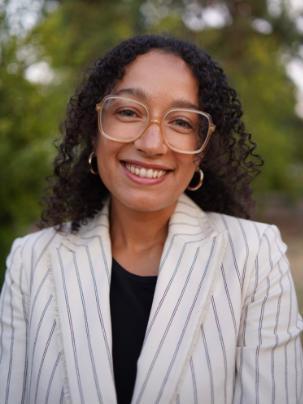What do we hope to accomplish? What will success look like? What will it take to get there? These are some of the questions I grapple with as GCIR’s Programs Learning Manager. My position is new, reflecting the organization’s commitment to proactive learning throughout our work. In a nutshell, I aim to support the team in building evaluative capacity, including through the design (and constant iteration) of ways of working that make it easy for people to engage meaningfully in learning processes.
Like so many others, my history has been profoundly impacted by migration, a fact that no doubt led me here. I was born in Costa Rica to a Costa Rican father and an American mother. Although my parents intended to stay and live in sunny, warm, tropical Costa Rica, we migrated to the Northeast United States when I was a baby to care for my aging maternal grandparents, themselves descendants of immigrants from Germany and Poland who landed at Ellis Island. My border-traversing DNA was likely a key factor in my decision to study International Affairs and later Migration Studies for my master’s degree. My studies then led me to research departments within international organizations, most recently the United Nations, where I learned the power of data, evidence, knowledge, and storytelling for informing policy and decision-making at all levels.
I arrived at GCIR in December 2022, weeks before the launch of our new theory of change. The timing was fortuitous: right away I was equipped with the organization’s and our key partners’ best thinking about how to address the problem at hand; namely, that racial capitalism and militarism inflict harm upon, and withhold power from, people and communities who seek not only to stay, but also to move freely, work, transform, and thrive. In my role, I aim to build upon the lessons of my experience so far – including the practice of looking for stories in data – to hold ourselves accountable to this bold and brave new theory of change. Learning, to me, is an ongoing process rather than a sequence of events or something that is reserved for the end of a project cycle.
There are several principles I’ve identified to guide my work. The learning must be:
- Timely and fit for purpose. I aim to help the team ask the right questions at the right time, avoiding the temptation to conduct learning on absolutely everything. This principle is about being strategic about the use of our resources for maximum impact.
- Collaborative. If we are to learn how best to achieve our aims, we need to harness the creativity and experience of everyone on the team, as well as stakeholders like funders and movement leaders.
- Data-informed, not data driven. As I develop the learning framework and include metrics on what can help us define success, I am cautious not to let numbers have the final say. Instead, I take a story-oriented approach, pulling in qualitative data and the lived experiences of our staff, board, and partners to get the story right.
- Reflexive. My own positionality, as in the political context that creates my identity in terms of race, class, gender, sexuality, and ability status, inevitably affects the learning framework. The same goes for others who I engage in the process. My aim is not to mitigate the impacts of positionality on the work, but rather to acknowledge it and name and cede power as necessary.
Before concluding this piece, I want to leave you with one last point, which is that, as a newcomer to the philanthropic space, I am excited about the possibilities. There is a potentially colossal and game-changing role for philanthropy to play in making transformative change for migrants in the U.S., and I look forward to contributing to that effort. My firm belief is that in justice work, immigrant justice included, there’s a place for everyone. Feminist poet Diane di Prima wrote: “No one way works, it will take all of us shoving at the thing from all sides to bring it down.” So, let’s all join together from wherever we are: whether we’re philanthropic leaders or movement leaders, service providers, crisis responders, workers and laborers of all kinds, students, researchers, dreamers or Dreamers, poets, musicians, artists, futurists, religious and spiritual community members, government workers, judges and lawyers, and all those willing to make good and necessary trouble. Together, we can make lasting change for immigrants in this country, living up to our ideals of freedom and tolerance for all.
